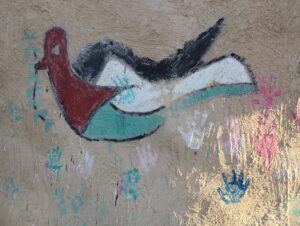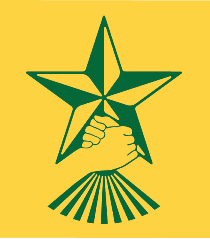International Women’s Day – Peacebuilding in the West Bank

In the lead up to International Women’s Day, KAIROS and its partners have been immersed in the Final Reporting for our six-year Women of Courage: Women, Peace and Security program with Global Affairs Canada, including Wi’am: Palestinian Conflict Transformation Centre, our partner in the West Bank, Palestine.
Throughout the program’s six years, Wiam has worked with local women’s groups in West Bank villages. Over the years these groups have multiplied and strengthened. Last year (2022/23) Wi’am worked with women’s groups in nine communities. They have been working with these local women’s groups to build conditions for just, equitable and sustainable peace and have been calling for an end to occupation so that this peace can flourish.
Wi’am’s programming with local groups includes income-generating projects, employment training, legal training, and workshops on international and national laws that protect their rights. Women are taught peace and political negotiation skills and offered treatment for psychological and physical wounds caused by the conflict.
Wi’am has become a respected reference on women’s rights, mediation and peacebuilding in the community. They work with civil society networks, municipal councils and male allies, some of whom originally opposed the program. They have developed networks of male allies including the Bikafi Alliance, and the HeforShe campaign. Like the other WPS partners, Wi’am is helping empower victims to become voices in their own defense and for community justice and peace.
In the last five months, Wiam has seen this work for peace being extinguished and these voices silenced. In their Final Report, Wiam writes about the continuous bombardment of Gaza by the Israeli military and the ground invasion that began on October 27 in response to the Hamas attacks. When Wiam submitted their report on December 31, according to the Gaza Health Ministry reports, the confirmed death toll of Palestinians in Gaza stood at almost 25,000 people, the majority of whom are women and children. We now know that this number has reached 30,000. This violence has spilled into the West Bank with a marked increase in settler and military violence.
2023 was already the most dangerous year to be a Palestinian. This has only intensified. Wi’am writes that this violence threatens everyone, including program participants and peacemakers, especially enroute to and from various destinations in the West Bank. While this is true for both men and women, this violence particularly impacts women and children. However, as was so evident in the reporting for this final year, the unprecedented level of violence has not led Wi’am to abandon their commitment to the communities that they serves; rather, Wi’am has found other ways to support and accompany them, deliver much needed programs, such as psychosocial support, and provide space for youth and women in these challenging times.

We recently spoke with our partner, Wiam: about the situation they face daily, they told us:
“We continue to be unable to shut off the news in our life. Every day, there are more raids into the West Bank. More people are taken. Just two days ago, they rounded up over 20 men from Bethlehem in the middle of the night, going into refugee camps, going into the city centers.”
They talked about their need to shift their work, to work in different ways because they are no longer able to travel to and reach the local women’s groups in communities beyond Bethlehem:
“Within the closure and, in some areas – invasion, the mobility became so difficult. But as a center, still with the perseverance that we have, we always find ways to go to reach some of the vulnerable areas. So, we shifted the focus of our work within the Bethlehem community and the vulnerable areas around Bethlehem. Refuges, some villages, those areas that we have been focusing on. That’s one of the shifts in the programs that we did.”
They confided how the work is needed more than ever:
“I think we have more mediation cases and we have more psychosocial support and counseling and some of it is face to face and some of it through our hotline and even from villages more, because the hotline is open 24 hours. It is with us and during the day it is in the office, we have a lot of activities.”
They spoke about how their work in training women to be trainers themselves has allowed the local groups to continue in villages, even when Wi’am is not able to reach them:
“Even though these are awful circumstances, it has allowed us to kind of activate the multiplier effect of this program. Because, of course, we have the training-of-trainers’ program as it relates to CEDAW [Convention on the Elimination of All Forms of Discrimination against Women], as it relates to UNSCR 1325, as it relates to gender activity, as it relates to being able to discuss the psychosocial impacts of war, especially as it relates to women and girls.”
“And we are finding ourselves, especially for the areas that we are unable to reach, that we have to fully rely on those that we’ve worked with, on those that we have trained through this program so that they may be able to continue this type of programming in the communities that we are unable to reach.”
They spoke about the toll on themselves as staff and the important work they have done in building self-esteem for front-line workers:
“So, we have to be strong in order to give them the supports. Otherwise, we cannot make it. So I think during the programs that we’ve been working on the well-being, self-esteem and these workshops that we did it with the groups, right now it helps those women a lot on how to deal in a difficult situation, how to communicate, how to cope, how to adapt.”
They discussed the impact of the program on Wi’am as an organization and them as individuals:
“And even within ourselves as a team, we are a team. We felt that we became strongest, bounded, understanding… I cannot stop talking about the impact of the project. I would really like to highlight the impact of the program on ourselves too. Because growing has been from the beginning. We learn more. It is, you know, this process of learning, sharing, that is very important. We have become more critical. We become more self-critical.
“And this is very important that we are growing with this program and others who are around us, not only in the office and outside we have been growing and we are able to challenge others with courage.”
And finally, about resilience they added:
“But at the same time, every time things like this happen, we double down our commitment to the work that we do, justice building, peace building, working towards some form of civil society that is strong, that is powerful, that is able to go through what it goes through and come out on the other end and say, hey, forgive us for ruining your plans. We are still here and we will thrive and we will continue.”
I highlight Wi’am’s words on International Women’s Days because they provide such a strong example of the defiance and strength of women peacebuilders and organizations. They refuse to allow their work to be extinguished by military might and their voices silenced by the deafening rhetoric of war.
I know that resilience is a problematic word. No one should have to be this resilient. We need to ask why we expect Palestinians and Palestinian women to be so and to keep being so? Why can’t we do a better job of dismantling the systems of injustice that require them to be constantly on the frontlines?
KAIROS has been outspoken in its call for Canadian action to help end the violence in Israel and Palestine and advocate for a two-state solution. We call on Canada to immediately:
- Resume and enhance funding for humanitarian needs to Gaza.
- Cease Canadian export of military goods.
- Support the proceedings and outcome of the International Court of Justice
- Call for an immediate and permanent ceasefire.
- Release all hostages – both the Israeli hostages held by Hamas – and the Palestinian hostages held in the Israeli prison system.
Canada could look to women peacebuilders in Palestine and Israel for its inspiration. Their resiliency, tenacity and defiance in the face of militarized violence, and their deeply rooted commitment to peace, justice and equity contribute to the few flickering flames of hope left for humanity today. We need to shelter, nurture, and amplify them and their work. Our lives depend on it.
By Rachel Warden, Partnerships Manager, KAIROS Canada



